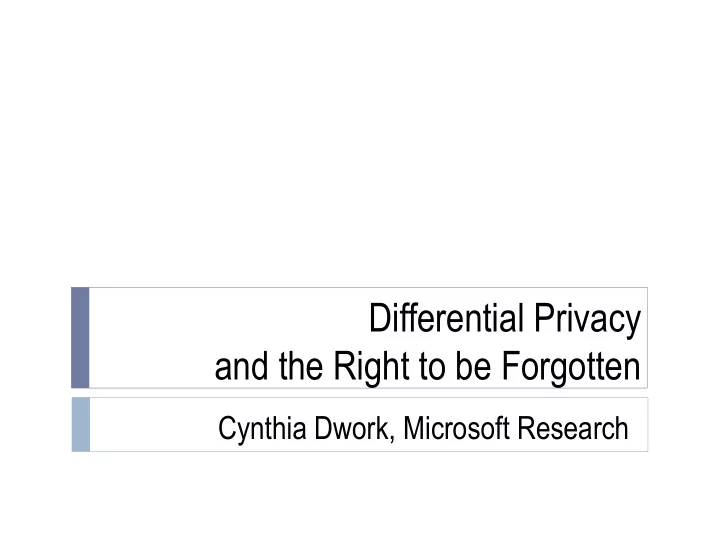

Differential Privacy and the Right to be Forgotten Cynthia Dwork, Microsoft Research
Limiting Prospective Use } Lampson’s approach empowers me to limit the use of my data, prospectively
Limiting Future Use: Raw Data
Limiting Future Use: Raw Data Use of blood sample data Showing my data to subscribers Reporting my past
Limiting Future Use: Entangled Data Demographic Summaries ? Recommendation system Ordering of search hits GWAS test statistics
Re-Compute Without Me? } Expensive; Great vector for denial of service attack } Privacy compromise Statistics including my data Statistics excluding my data Sickle cell trait: 33 Sickle cell trait: 32
Differential Privacy as a Solution Concept } Definition of privacy tailored to statistical analysis of big data } “Nearly equivalent” to not having had one’s data used at all } Safeguards privacy even under re-computation Dwork, McSherry, Nissim, and Smith 2006
Privacy-Preserving Data Analysis? q 1 a 1 q 2 M a 2 q 3 a 3 Database data analyst } “Can’t learn anything new about Nissenbaum”?
Privacy-Preserving Data Analysis? q 1 a 1 q 2 M a 2 q 3 a 3 Database data analyst } “Can’t learn anything new about Nissenbaum”? } Then what is the point?
Privacy-Preserving Data Analysis? q 1 a 1 q 2 M a 2 q 3 a 3 Database data analyst } “Can’t learn anything new about Nissenbaum”? } Then what is the point?
Privacy-Preserving Data Analysis? q 1 a 1 q 2 M a 2 q 3 a 3 Database data analyst } Ideally: learn same things if Nissenbaum is replaced by another random member of the population
Privacy-Preserving Data Analysis? q 1 a 1 q 2 M a 2 q 3 a 3 Database data analyst } Ideally: learn same things if Nissenbaum is replaced by another random member of the population (“stability”)
Privacy-Preserving Data Analysis? q 1 a 1 q 2 M a 2 q 3 a 3 Database data analyst } Stability preserves Nissenbaum’s privacy AND prevents over-fitting } Privacy and Generalization are aligned!
Differential Privacy } The outcome of any analysis is essentially equally likely, independent of whether any individual joins, or refrains from joining, the dataset. } Nissenbaum’s data are deleted, Sweeney’s data are added, Nissenbaum’s data are replaced by Sweeney’s data, etc. } “Nearly equivalent” to not having data used in the first place
Formally 𝑁 gives 𝜗 -differential privacy if for all pairs of adjacent data sets -differential privacy if for all pairs of adjacent data sets 𝑦 , 𝑧 , and all subsets 𝑇 of possible outputs Pr [𝑁(𝑦) ∈ 𝑇] ≤(1+ 𝜗 ) Pr [𝑁(𝑧) ∈ 𝑇] Randomness introduced by 𝑁
Properties } Immune to current and future(!) side information } Automatically yields group privacy } Understand behavior under composition } Can bound cumulative privacy loss over multiple analyses } Permits “re-computation” when data are withdrawn } Programmable } Complicated private analyses from simple private building blocks
Rich Algorithmic Literature } Counts, linear queries, histograms, contingency tables (marginals) } Location and spread (eg, median, interquartile range) } Dimension reduction (PCA, SVD), clustering } Support Vector Machines } Sparse regression/LASSO, logistic and linear regression } Gradient descent } Boosting, Multiplicative Weights } Combinatorial optimization, mechanism design } Privacy Under Continual Observation, Pan-Privacy } Kalman filtering } Statistical Queries learning model, PAC learning } False Discovery Rate control } Pan-Privacy, privacy under continual observation …
Which is “Right”?
Which is “Right”? q 1 a 1 q 2 M a 2 q 3 a 3 Database data analyst } Stability preserves Nissenbaum’s privacy AND prevents over-fitting } Differential privacy protects against false discovery / overfitting due to adaptivity (aka exploratory data analysis) Dwork, Feldman, Hardt, Pitassi, Reingold, and Roth 2014
Not a Panacea Fundamental law of information recovery 𝜗 : a nexus of policy and technology [DN03,DMT07,HSR+08,DY08,SOJH09,MN12,BUV14,SU15,DSSUV16] [Dwork and Mulligan 2013]
Thank you! Washington, DC, May 10, 2016
Recommend
More recommend